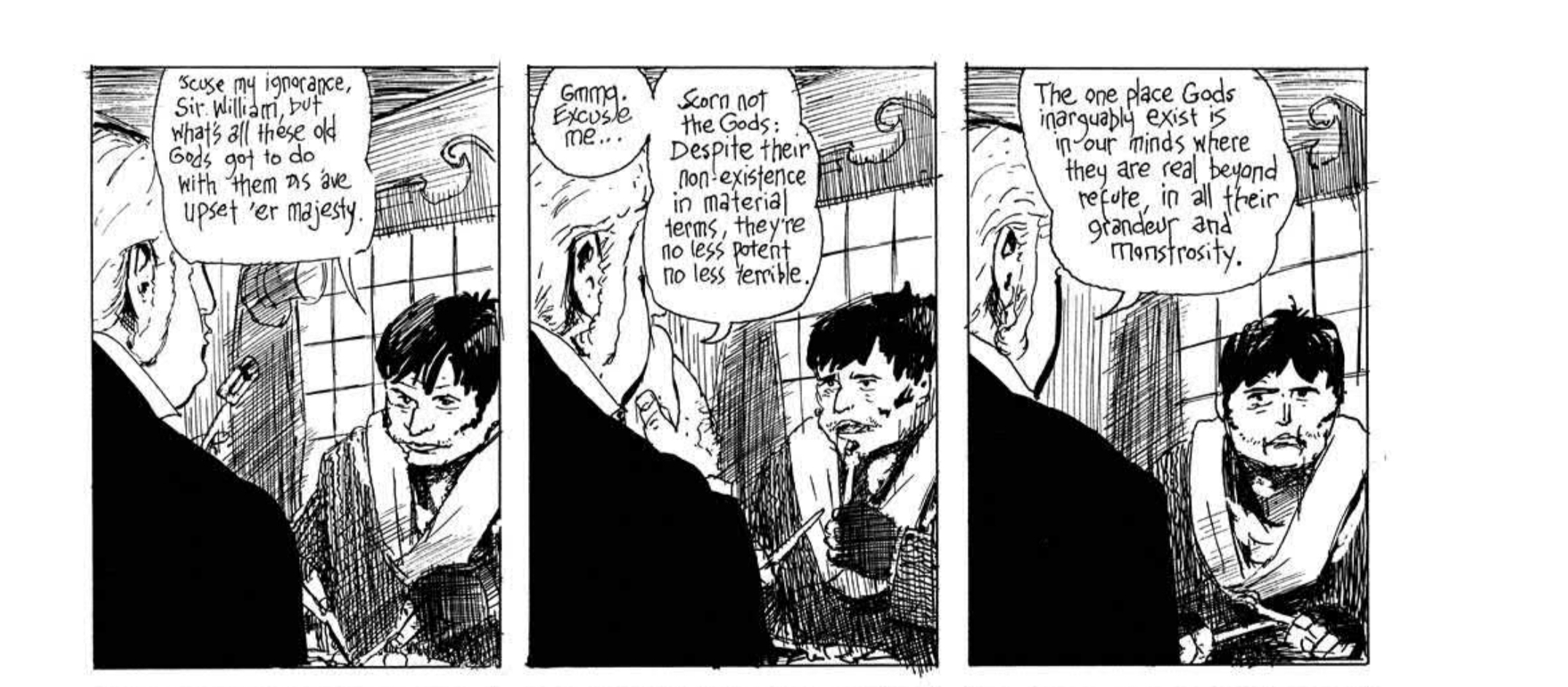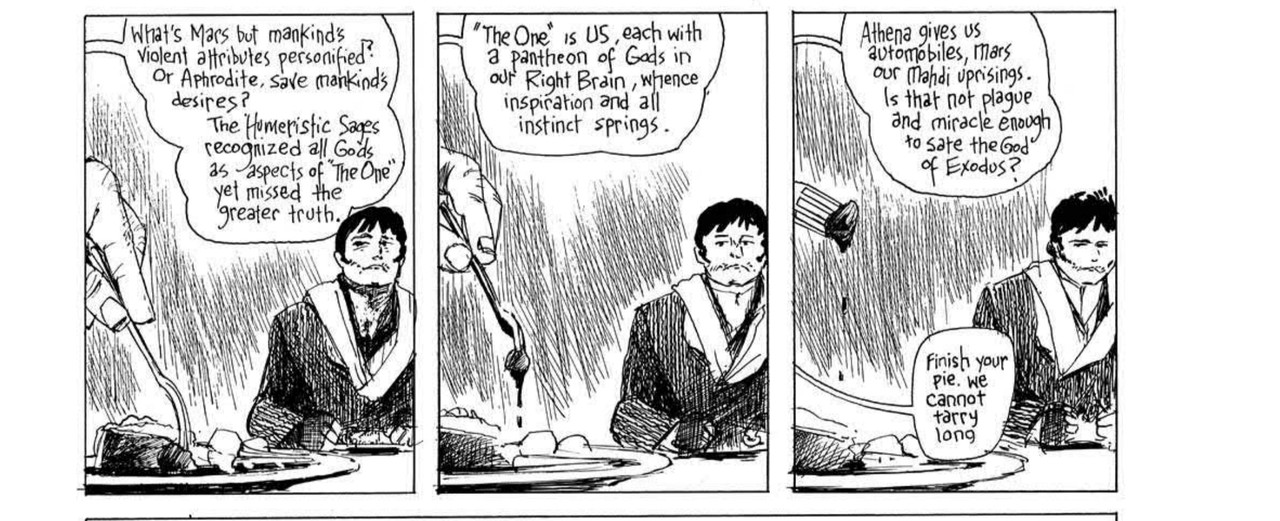«hallowed be thy Name, thy Kingdom come», that’s ‘the christians’ Aim’/Islam
The world is ugly sometimes
We(sterners), aggressors, are still the main(~only) obstacle to ‘world peace’/‘a union of diversities’
♪All we are saaying…♬(, are we even trying ? we could/should/must protect them&us)
- 7 Posts
- 34 Comments

 12·1 year ago
12·1 year agoThe title isn’t exact :
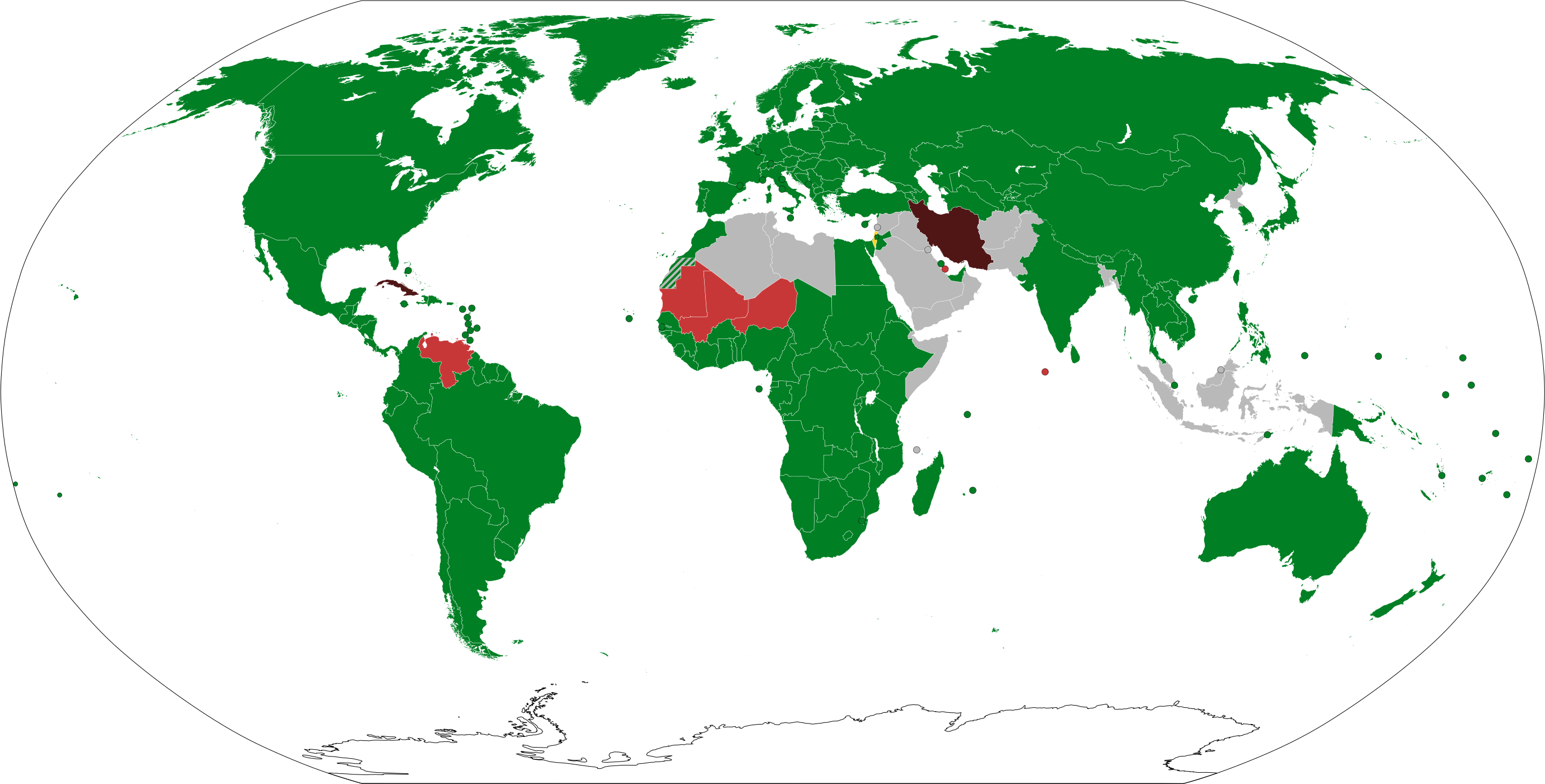

Moreover, their relations were only re-instaured after the western-supported coup by J.Añez :

(Here’s Colombia’s president 6 hours ago b.t.w., among other examples)
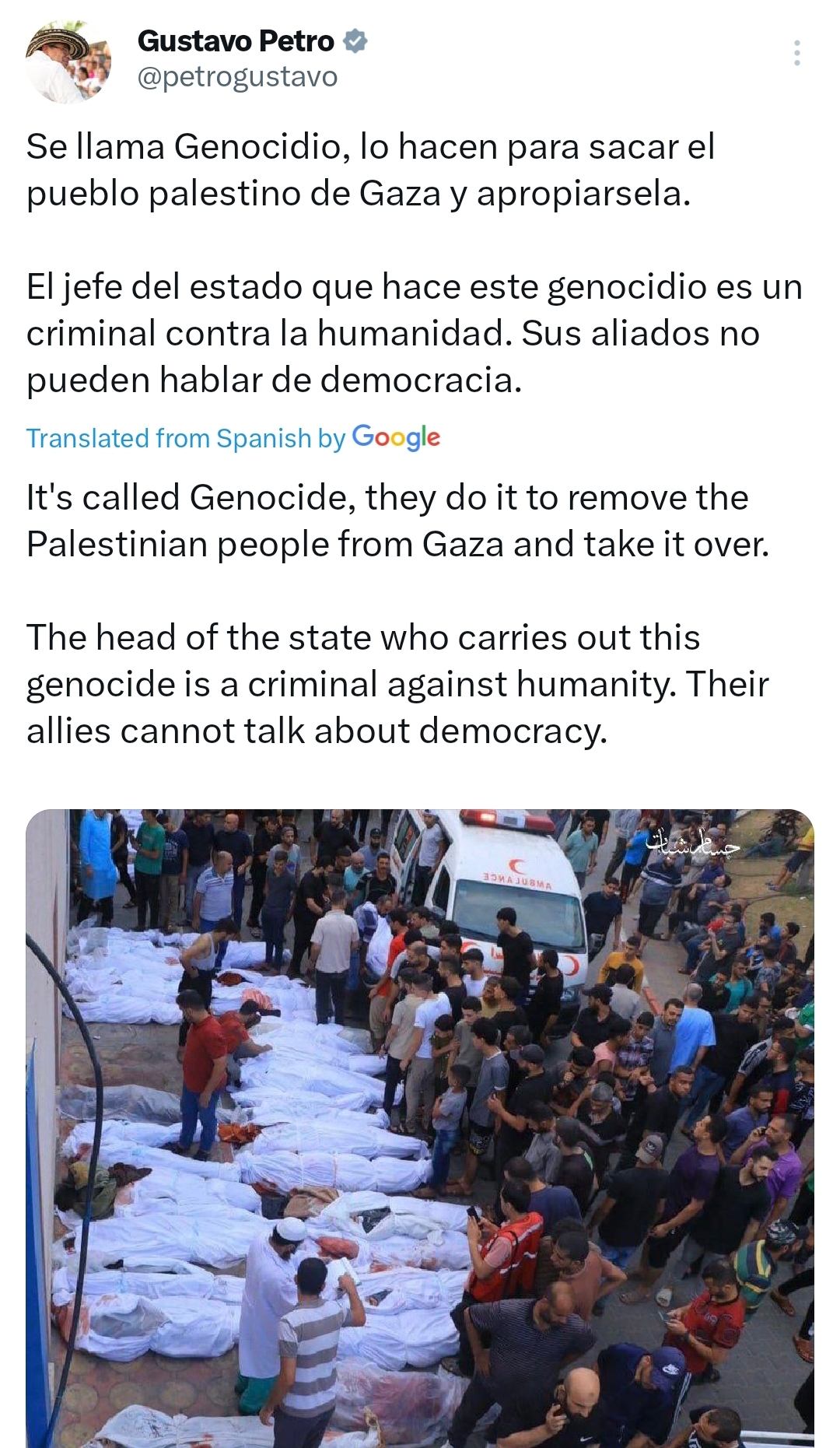
(no need to point out that it would be safer for them not to take position for//against any side. The article also spoke of Argentina, here’s an interesting 2mn-long point of view)

 191·1 year ago
191·1 year agoThey claim to fight disinformation yet speak about a “technical glitch”, classic, just like cops lying on their depositions, what a way to set an example.
Unless the creatures, overall, would prefer to have never existed in the first place, then the Creator isn’t evil and should be praised(, that’s only one reason, for example an other one would be our search for Absolute/Greatness/Good/…)
I don’t entirely agree with my comment either, because there’s multiple interpretation of Hell.
One of them is interesting, it says that if our consciousness survives after our death, our mind will finally think clearly, we’ll remember our past better than if it happened today, and we’ll be overwhelmed by shame, this hell would be created by ourselves.
Another one would talk about a real place, but not in the afterlife but right here, on Earth(, it combines perfectly with this talk of afterlife if you believe in reincarnation), and says that if we all live our lives ‘searching for’/‘aiming at’ God, then our descendants/reincarnations will live in Paradise(, or in Hell if we don’t).
There’re other interpretations, as well as the thought that we’re not free since we’re determined, so God decided before our birth whether we would end up in Hell or in Paradise, a thought discussed in the Middle-Ages and rejected in favor of free-will(, i don’t think Spinoza would disagree with the conclusion that God predestined us for Hell, if he believed in Hell).
Obviously, the most common explanation is that police(wo)men didn’t existed back then, God-fearing people was the equivalent of virtuous people, even when nobody can see/stop them.
They merely said that being separated from God means suffering, while following H…er.im means walking towards the establishment of H…er.is Kingdom/City unto Earth. They talked more about Hell as a state than as a physical place, but, well… who cares nowadays, right ? Parabola never taught us anything about the real world, the spirit doesn’t exist, and morals are relative, they were simply naive ignorants who never had anything to teach us, embrace modernity and reject 100% of the past.
anyone who worships God is also good by default, and of course this logic follows that anyone that doesn’t worship God is evil by default.
If that was the case they wouldn’t put an emphasis on hypocrites.
Justice≠Revenge, otherwise Guantanamo, Abu Ghraib, and the rest, would be justified.
If every evil was stopped though it would be the end of ‘our trip’/‘any possible progress’.

 91·1 year ago
91·1 year agoHordes of drones flying over the city in order to find any possible infraction, don’t you want to feel safe ? (/s obv.)
In any case, we don’t get to decide, it’s our so-called representatives who’ll take the decision, with or without campaigns of communication.
At least in a real democracy, if the whole population agree to it, then i’d conform more readily to our choice even if i personally disagreed, but we’re not in a democracy, in which the demos has the cratos.
We’re in a constitutional republic, and our representatives are democratically elected, once they take the power from the people to decide in their stake it’s not a democracy, such as the one that once existed in Athens(, only for citizens, but the logic is the same).
Having the possibility to cancel any decision with a strong enough popular petition would be a first step, yet it’d be unimaginable for our “democratic” leaders, because the population needs to be directed, and shouldn’t be listened to. We’re ignorant while they know(, whose fault is it since we follow ? we obtain the population we deserve), people are stupid(, but we never include ourselves, we all have the same potential), we have to trust our leaders, etc.
In truth, we know what’s desirable, and anyone is apt to debate on whether or not this aim is indeed desirable. We only need to have experts and do experiments to test their predictions, because we don’t know anything about the technical details, almost as much as our leaders who trust these experts without obtaining the promised results sometimes(, preliminary experiments won’t prevent all mistakes, but at least it’d be our mistake, not theirs, we rarely can’t go back on our decisions).
Well, whatever, just to say that the decision isn’t up to us(, and consent is manufactured).

 11·1 year ago
11·1 year agoI’ve read some criticisms of E.Musk(, from the funder of Lemmy, who probably temporarily inherited this account while he was a mod for all i know), but back then it was to convince leftists that E.Musk wasn’t an exception : all billionaires are thieves and enemies of the workers. The fact that they had to underline that E.Musk wasn’t an exception may prove something, they/we would have preferred if all these achievements were the results of, e.g., a cooperative, perhaps one day in the future, perhaps in an other country if the west doesn’t destroy it(Huawei).
It’s when he bought Twitter at an unbelievable price because he was annoyed at censorship(, don’t believe him if you want,) that the hate really suddenly started to spread, with stupid arguments that i’ve read and never understood(, he fired people ? Lots of them were useless and the workforce has been multiplied in recent years). Most of all he finally began to bring improvements in a stagnating Twitter.
I don’t get why silent billionaires like the Walmart family are ignored while the attention is focused on the few who are using their wealth for beneficial ventures(, like Bill Gates or Elon Musk).
He probably did/enabled more than anyone else : Tesla(electric cars), SpaceX, Starlink, SolarCity/‘Tesla Energy’, the Boring Company(hyperloop), OpenAI and xAI, Neuralink, …, so he’s probably the last billionaire i would criticize, not the first.

 21·1 year ago
21·1 year agoBecause fighting against disinformation has always been about fighting for the control of the narrative
Big up to all the bots in the comments.
deleted by creator
I’ve never read that one, it’s much better than the communist manifesto i.m.h.o., even if it’s a bit too short to take into account any counter-argument, and it’d need an update almost 200 years later. I remember know that there’s obviously a difference between the bourgeoisie and the nobility, but there must exist some kind of word encompassing both the nobles from the past and the modern bourgeoisie/capitalists. Anyway, here’s a relevant quote i liked :
The bourgeoisie annihilated the power of the aristocracy, the nobility, by abolishing the entailment of estates – in other words, by making landed property subject to purchase and sale, and by doing away with the special privileges of the nobility. It destroyed the power of the guildmasters by abolishing guilds and handicraft privileges. In their place, it put competition – that is, a state of society in which everyone has the right to enter into any branch of industry, the only obstacle being a lack of the necessary capital.
And, unrelated :
** — 14 — What will this new social order have to be like ?**
Above all, it will have to take the control of industry and of all branches of production out of the hands of mutually competing individuals, and instead institute a system in which all these branches of production are operated by society as a whole – that is, for the common account, according to a common plan, and with the participation of all members of society.
It will, in other words, abolish competition and replace it with association.
Moreover, since the management of industry by individuals necessarily implies private property, and since competition is in reality merely the manner and form in which the control of industry by private property owners expresses itself, it follows that private property cannot be separated from competition and the individual management of industry. Private property must, therefore, be abolished and in its place must come the common utilization of all instruments of production and the distribution of all products according to common agreement – in a word, what is called the communal ownership of goods.
In fact, the abolition of private property is, doubtless, the shortest and most significant way to characterize the revolution in the whole social order which has been made necessary by the development of industry – and for this reason it is rightly advanced by communists as their main demand.— 15 — Was not the abolition of private property possible at an earlier time ?
No. Every change in the social order, every revolution in property relations, is the necessary consequence of the creation of new forces of production which no longer fit into the old property relations.
Private property has not always existed.
When, towards the end of the Middle Ages, there arose a new mode of production which could not be carried on under the then existing feudal and guild forms of property, this manufacture, which had outgrown the old property relations, created a new property form, private property. And for manufacture and the earliest stage of development of big industry, private property was the only possible property form; the social order based on it was the only possible social order.
So long as it is not possible to produce so much that there is enough for all, with more left over for expanding the social capital and extending the forces of production – so long as this is not possible, there must always be a ruling class directing the use of society’s productive forces, and a poor, oppressed class. How these classes are constituted depends on the stage of development.
The agrarian Middle Ages give us the baron and the serf; the cities of the later Middle Ages show us the guildmaster and the journeyman and the day laborer; the 17th century has its manufacturing workers; the 19th has big factory owners and proletarians.
It is clear that, up to now, the forces of production have never been developed to the point where enough could be developed for all, and that private property has become a fetter and a barrier in relation to the further development of the forces of production.
Now, however, the development of big industry has ushered in a new period. Capital and the forces of production have been expanded to an unprecedented extent, and the means are at hand to multiply them without limit in the near future. Moreover, the forces of production have been concentrated in the hands of a few bourgeois, while the great mass of the people are more and more falling into the proletariat, their situation becoming more wretched and intolerable in proportion to the increase of wealth of the bourgeoisie. And finally, these mighty and easily extended forces of production have so far outgrown private property and the bourgeoisie, that they threaten at any moment to unleash the most violent disturbances of the social order. Now, under these conditions, the abolition of private property has become not only possible but absolutely necessary.As well as :
Democracy would be wholly valueless to the proletariat if it were not immediately used as a means for putting through measures directed against private property and ensuring the livelihood of the proletariat.
(…)
The general co-operation of all members of society for the purpose of planned exploitation of the forces of production, the expansion of production to the point where it will satisfy the needs of all, the abolition of a situation in which the needs of some are satisfied at the expense of the needs of others, the complete liquidation of classes and their conflicts, the rounded development of the capacities of all members of society through the elimination of the present division of labor, through industrial education, through engaging in varying activities, through the participation by all in the enjoyments produced by all, through the combination of city and country – these are the main consequences of the abolition of private property.
I’m not sure about that, weren’t nobles/landlords capitalists by extracting a rent from the ‘working class’/laborers ?
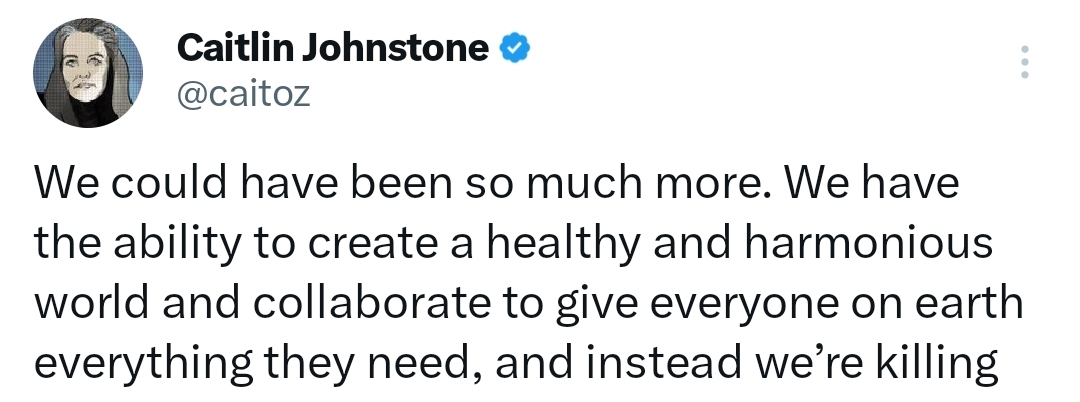



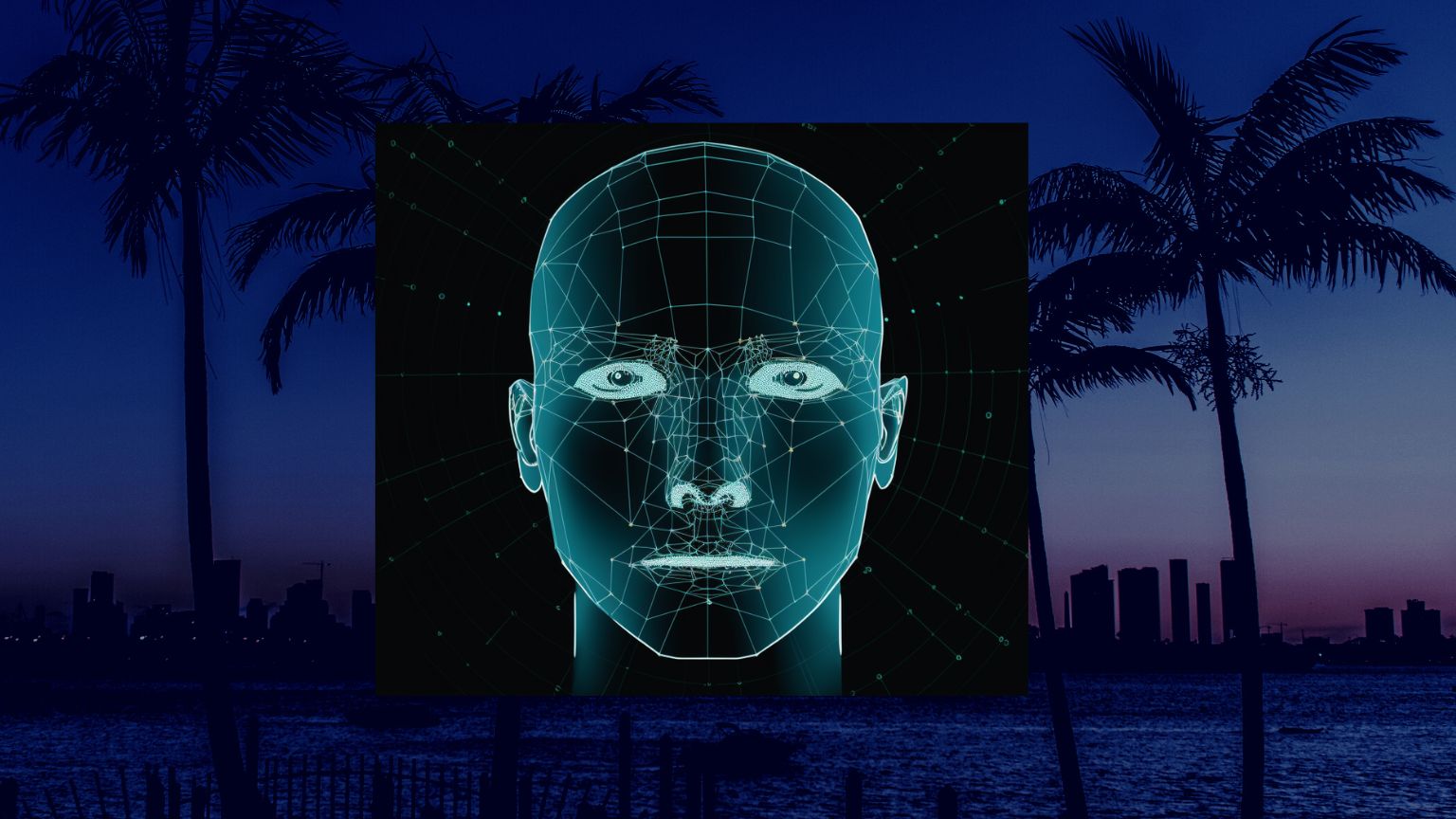





God(&gods)( in the material world, but also) in the world of Idea(l)s(, and probably other worlds inaccessible to humans as well) :
